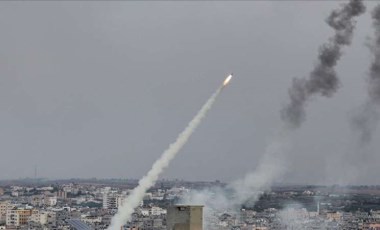Opinion: The Middle East is Once Again on Fire
Mine Esen, Editor-in-Chief

Amid the escalating conflict in Ukraine, the Syrian crisis has receded from the international spotlight. However, Ankara found itself thrust back into the forefront of global attention following an attempted attack by YPG/PKK terrorists infiltrating from Syria, on October 1st.
Reports emerged of extensive Turkish Armed Forces airstrikes in Syria, targeting a range of assets from oil facilities to the YPG's economic lifeline in the region and their headquarters. This renewed focus has once again shifted the spotlight onto the strained relations between Ankara and Washington.
Before the military operation, Ankara conveyed a clear message to "third parties" to vacate areas housing terrorist targets, an unambiguous reference to the United States. Nevertheless, questions arose concerning the American F-16's downing of a Turkish Armed Unmanned Aerial Vehicle (UAV) in Syria.
Some argue it was an inadvertent act resulting from miscommunication as the UAV approached the US deployment, which offered support to the YPG. Conversely, others perceive the targeting of Turkey's prized UAV, a product of its defence industry, as a deliberate act to intimidate Ankara.
Despite diplomatic efforts in US-Turkey talks ostensibly aimed at averting escalation, these two NATO members now find themselves in the line of fire.
The United States, citing its alliance with the YPG as essential in combating ISIS, continues to face Ankara's persistent call to withdraw its support. Will Washington heed this plea and sever its alliance with the YPG in favour of aligning more closely with Turkey?
If so, what stance will Russia, a close ally of Damascus, adopt? And what about Iran? Furthermore, amidst this complex proxy war characterized by sectarian divisions, what will be the response of the various militia forces and tribes involved? Given the multitude of contentious issues—ranging from FETÖ (Gulenist terrorist organization) and the PKK to the F-35, Sweden, and NATO debates—can Turkey place trust in Washington's assurances?
The Syrian crisis extends beyond the YPG/PKK issue to encompass the jihadist Hayat Tahrir al-Sham (HTS)-controlled Idlib province, which lies close to Turkey's border. Russia, much like the US, maintains well-known relations with the YPG while Iran supports Damascus through its Shiite militias and indirectly suggests a reluctance to relinquish its sphere of influence to Turkey.
Amidst these intricate dynamics, a path toward resolution appears elusive, with the prioritization of interests and restoration of relations with Damascus via the Adana Protocol emerging as a potential route to consider.
Two-State Solution is a Must
As Syria remains in focus, a violent spiral has manifested itself in the Palestinian-Israeli arena. Hamas forces governing Gaza launched a shock attack on Israeli settlements, prompting an immediate retaliation from Israel. Regrettably, civilians are once again bearing the brunt of this conflict.
While Iran and Lebanese Hezbollah voice support for the Palestinians, concerns about a wider regional conflict loom. Notably, the Gulf countries, which have taken steps towards normalization with Israel under US mediation, exhibit a cautious approach, highlighting the evolving nature of Middle East geopolitics compared to five years ago.
The path to peace lies under the UN-endorsed two-state solution, ensuring an independent Palestinian state free from occupation. Failure to achieve this risks perpetuating the Palestinian cause as a focal point for global power struggles, proxy wars, and deadly confrontations involving religious extremists on both sides.
Strenght Through Secularism
The world's trajectory is increasingly unpredictable, drawing comparisons to the period preceding the First and Second World Wars, as suggested by some political scientists and economists.
As we commemorate the 100th anniversary of our Republic, we must remain vigilant against attempts to resurrect the Sykes-Picot agreement. Developments in Syria, Iraq, Palestine-Israel, and the Caucasus carry immense significance. In shaping its foreign policy, Turkey must strike a delicate balance, mindful of its self-interests, and avoid entanglement in the Middle East's vortex of violence.
What sets Turkey apart and strengthens its position in the region is its commitment to democracy and secularism. It remains puzzling why some seek to undermine these principles.
Last week marked the 97th anniversary of the "Turkish Civil Code" coming into effect. The Istanbul Women's Organizations Union emphasized that this code symbolizes secular law and represents a revolution for women's rights.
The Civil Code, a cornerstone of women's equal citizenship rights with men, encompasses key provisions such as equal inheritance, civil marriage requirements, mutual consent in marriage, divorce regulations, alimony, parental rights, prohibition of polygamy, and the right to work.
These are pivotal achievements gifted to us by Atatürk, a visionary leader who guided the transition from a ummah to a nation, fostering a democratic, modern, and egalitarian consciousness.
It is often said that one must lose something to appreciate its value; hence, let us cherish our rights and not be deceived by those who hop on the comprehensive democracy train only to disembark after a few stops.

En Çok Okunan Haberler
-
 Önder'in sağlık durumu ile ilgili yeni gelişme
Önder'in sağlık durumu ile ilgili yeni gelişme
-
 Geldikleri gibi gidiyorlar!
Geldikleri gibi gidiyorlar!
-
 CHP, bir kurultay daha yapacak!
CHP, bir kurultay daha yapacak!
-
 Kütahyalı hakkında resen soruşturma başlatıldı
Kütahyalı hakkında resen soruşturma başlatıldı
-
 6 araştırma şirketinin anketinde çarpıcı sonuç!
6 araştırma şirketinin anketinde çarpıcı sonuç!
-
 'Bu haberi bir muhalif yapsaydı...'
'Bu haberi bir muhalif yapsaydı...'
-
 Özel, Devlet Bahçeli'ye seslendi
Özel, Devlet Bahçeli'ye seslendi
-
 Aynı menzile yürümeye devam!
Aynı menzile yürümeye devam!
-
 MHP'li Büyükataman'dan Özel'e yanıt!
MHP'li Büyükataman'dan Özel'e yanıt!
-
 Selçuk Kozağaçlı tahliye edildi
Selçuk Kozağaçlı tahliye edildi


